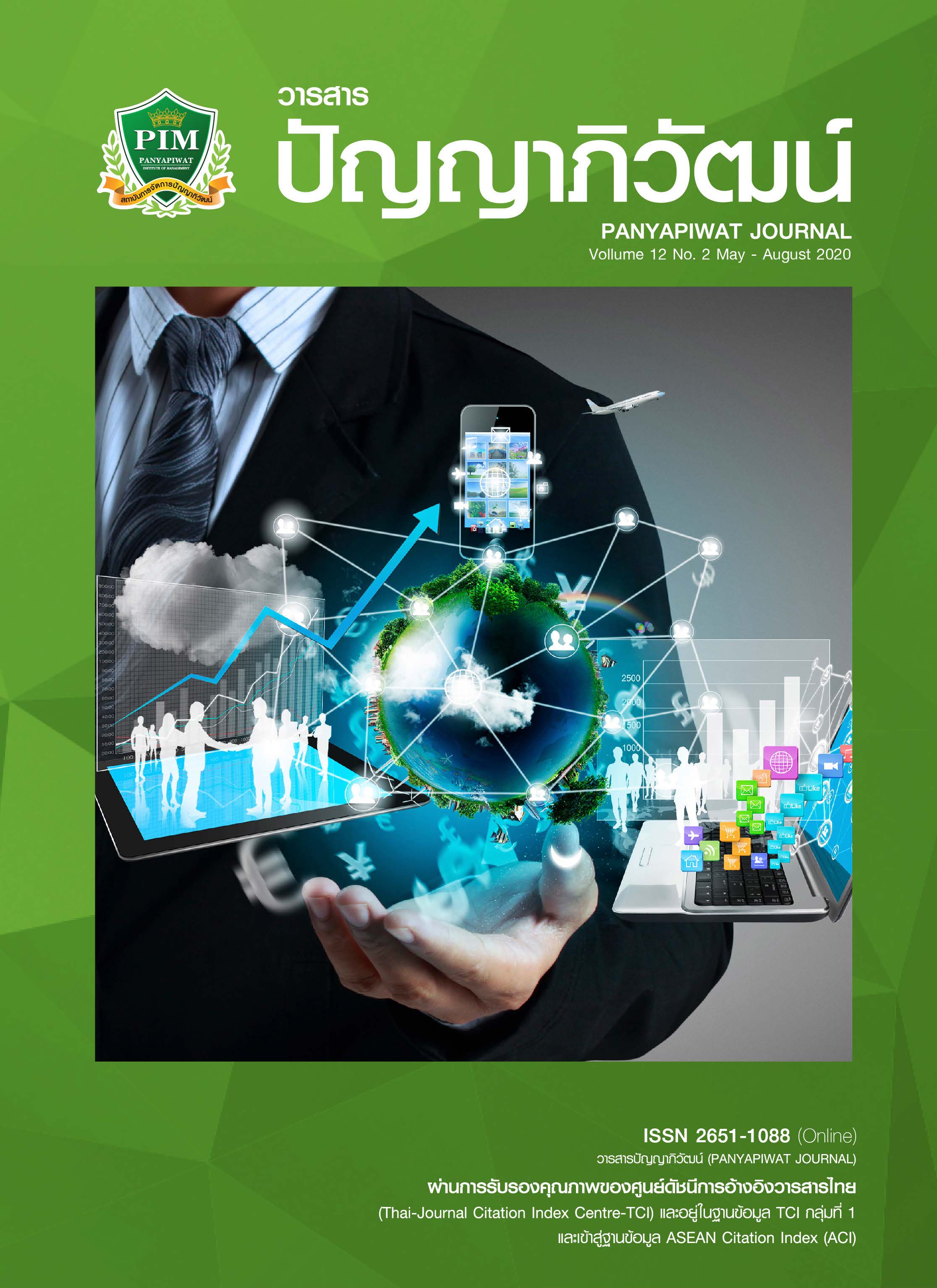การให้โอกาสทางการศึกษาผ่านทุนรัฐบาลสำหรับนักศึกษาต่างชาติ: เครื่องมือหลักในการสร้างซอฟต์พาวเวอร์ของจีน
Main Article Content
บทคัดย่อ
บทคัดย่อ
วัตถุประสงค์การวิจัยในครั้งนี้เพื่อประเมินประสิทธิผลของการสนับสนุนทุนรัฐบาลจีนสำหรับนักศึกษาต่างชาติในฐานะเครื่องมือที่สำคัญในการเสริมสร้างซอฟต์พาวเวอร์ การวิจัยในครั้งนี้ได้ใช้กลุ่มตัวอย่างคือ นักศึกษาต่างชาติที่มีวุฒิการศึกษา และที่มาของแหล่งทุนที่แตกต่างกัน จำนวน 34 คน เพื่อสำรวจทัศนคติที่มีต่อสาธารณรัฐประชาชนจีนและวิเคราะห์ความแตกต่างทางทัศนคติของกลุ่มที่มีที่มาของแหล่งทุนที่แตกต่างกัน ผลการวิจัยเชิงคุณภาพพบว่า กลุ่มตัวอย่างไม่ได้ให้ความสำคัญต่อประเด็นในการสร้างซอฟต์พาวเวอร์ผ่านการสนับสนุนทุนรัฐบาล อย่างไรก็ตาม ผลการวิจัยเชิงปริมาณได้แสดงถึงทัศนคติในทางบวกของกลุ่มตัวอย่างที่มีต่อสาธารณรัฐประชาชนจีนเพิ่มมากขึ้น โดยเฉพาะอย่างยิ่งทัศนคติต่อวัฒนธรรมและการศึกษาของจีนซึ่งส่งผลต่อการแนะนำและบอกต่อบุคคลใกล้ชิดเพื่อมาศึกษาต่อในจีน การวิจัยครั้งนี้ได้นำเสนอประเด็นกลยุทธ์การสร้างซอฟต์พาวเวอร์ของจีนผ่านประเด็นการให้โอกาสทางการศึกษาว่าแม้กลุ่มตัวอย่างจะไม่เกิดการรับรู้ถึงกระบวนการสร้างซอฟต์พาวเวอร์แต่กลับมีอิทธิพลต่อทัศนคติในทางบวกต่อจีนเป็นอันมาก
Article Details
“ข้าพเจ้าและผู้เขียนร่วม (ถ้ามี) ขอรับรองว่า บทความที่เสนอมานี้ยังไม่เคยได้รับการตีพิมพ์และไม่ได้อยู่ระหว่างกระบวนการพิจารณาลงตีพิมพ์ในวารสารหรือแหล่งเผยแพร่อื่นใด ข้าพเจ้าและผู้เขียนร่วมยอมรับหลักเกณฑ์การพิจารณาต้นฉบับ ทั้งยินยอมให้กองบรรณาธิการมีสิทธิ์พิจารณาและตรวจแก้ต้นฉบับได้ตามที่เห็นสมควร พร้อมนี้ขอมอบลิขสิทธิ์บทความที่ได้รับการตีพิมพ์ให้แก่สถาบันการจัดการปัญญาภิวัฒน์หากมีการฟ้องร้องเรื่องการละเมิดลิขสิทธิ์เกี่ยวกับภาพ กราฟ ข้อความส่วนใดส่วนหนึ่งและ/หรือข้อคิดเห็นที่ปรากฏในบทความข้าพเจ้าและผู้เขียนร่วมยินยอมรับผิดชอบแต่เพียงฝ่ายเดียว”
เอกสารอ้างอิง
Beijing International (2016). Beijing Government Scholarships. Retrieved January 28, 2018, from http://www.ebeijing.gov.cn/Study/Scholarships/
Blanchard, J. M. F. & Lu, F. (2012). Thinking hard about soft power: A review and critique of the literature on China and soft power. Asian Perspectives, 36(2), 565-589.
Creswell, J. W. & Plano Clark, V. L. (2007). Designing and conducting mixed methods research. Thousand Oaks (CA): Sage.
CSC. (2017). China Scholarship Council. Retrieved December 5, 2017, from http://en.csc.edu.cn/
Ding, S. (2008). To build “a harmonious world”: China’s soft power wielding in the global south. Journal of Chinese Political Science, 13(2), 193-213.
Fan, Y. (2008). Soft power: Power of attraction or confusion? Place Branding and Public Diplomacy, 4(2), 147-158.
Ferdinand, P. (2016). Westward Ho. The China dream and “one belt one road”: Chinese foreign policy under Xi Jinping. International Affairs, 92(4), 941-957.
Gill, B. & Huang, Y. (2006). Sources and limits of Chinese “soft power”. Survival, 48(2), 17-26.
Guo, J. M. (2012). From state soft strength to international soft power: Directions and approaches of promoting Chinese soft strength construction. Academic Monthly, 44(3), 16-21.
Hanban. (2016) Confucius Institute Scholarship Application Procedure. [Online] Available December 4, 2017 at http://english.hanban.org/article/2016-01/15/content_629582.htm
Hu, J. (2011). Cultural soft power: China’s perspective. Social Science, (5), 4-13 [in Chinese]
King, K. (2010). China’s cooperation in education and training with Kenya: A different model?. International Journal of Educational Development, 30(5), 488-496.
Krejcie, R. V. & Morgan, D. (1970). Determining sample size for research activities. Educational and Psychological Measurement, 30, 607-610.
Manzenreiter, W. (2010). The Beijing Games in the Western imagination of China: The weak power of soft power. Journal of Sport and Social Issues, 34(1), 29-48.
Nye, J. S. (1990). Soft power. Foreign Policy, 80, 153-171.
Nye, J. S. (2004). The decline of America’s soft power. Foreign Affairs, May/June.
Paradise, J. F. (2009). China and international harmony: The role of Confucius Institutes in bolstering Beijing’s soft power. Asian Survey, 49(4), 647-669.
Shambaugh, D. (2013). China goes global: The partial power. Oxford: Oxford University Press.
Wang, Y. (2008). Public diplomacy and the rise of soft power. The Annals of the American Academy of Political and Social Science, 616(1), 257-273.
Wilson, E. J. (2008). Hard power, soft power, smart power. The Annals of the American Academy of Political and Social Science, 616, 110-124.
Wu Y. (2018). The rise of China with cultural soft power in the age of globalization. Journal of Literature and Art Studies, 8(5), 763-778.
Yang, R. (2010). Soft power and higher education: An examination of China’s Confucius Institutes. Globalization, Societies and Education, 8(2), 235-245.
Zaharna, R. S. (2007). The soft power differential: Network communication and mass communication in public diplomacy. The Hague Journal of Diplomacy, 2(3) 213-228.


